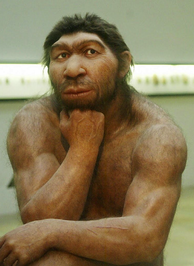 No doubt Charles R. Darwin was right when he discovered 'the survival of the fittest', even Sharon Moalem has an excellent point when he speaks about 'the survival of the sickest' [1], but what is really shocking is what I recently discovered: 'The Survival of the Stupidest'. Here is a way to look at it: Our brains are constantly integrating information about the world around us. That requires neuronal activity that can not be used at the same time to to do other things, such as actually think. Multi tasking is a myth debunked time and again [2]. Deep thinking about truly complex problems require total concentration. There is no room for assessing ones environment for imminent threats. So if in the early days of the hominoids, at the dawn of homo sapiens, our species would have been engaged in deep thinking the result would be clear: the individual would simply not survive long enough to reproduce. Consequently there will be no 'deep thought' genes to be inherited [3]. ... and then there is a Sabre-Tooth Cat lurking in the back ... This selective process continues to date: try thinking very hard about a complex problem while crossing the road... If you start young enough doing so you can rest assured that your genes will stay unique and will not be transferred into the pool of humanity. And because of the pre-selection that already happened over the past couple of hundred thousand years, there can only be one conclusion: We are stupid. [1] Sharon Moalem, 'Survival of the Sickest', HarperCollins Publishers, 2007. [2] The Myth of Multi Tasking: https://www.psychologytoday.com/blog/creativity-without-borders/201405/the-myth-multitasking [3] Of course it is still an open debate whether 'deep thought' genes actually exist, or whether it comes about from epigenetic selection or is just adaptation or nurturing...
5 Comments
Astronomers of the Maya civilization and astronomers of the Babylonian civilization were brilliant in predicting astronomical events. For instance, from meticulous observations of the Sun, Moon, Venus and Jupiter they were able to predict with astonishing accuracy the 584-day cycle of Venus or the details of the celestial track of Jupiter [1]. Yet they had no clue about our heliocentric solar system, they believed that the earth was flat and they were completely ignorant of the real movement of stars and planets while being convinced that the sky was supported by four jaguars, each holding up a corner of the sky.
They were basically doing what is now called Big Data or Data Science, a very powerful way to uncover patterns in historical data. Unfortunately, data science on its own might introduce false interpretations of causality, like jaguars carrying the sky. What we need in addition to that are computational predictive models that use fundamental first principles and mechanisms that can track the system over time and allow for quantitative validation and provide pointers to novel experiments to falsify or confirm our interpretations. In other words, we need a merger of the 'inductivism' from Sir Francis Bacon (Big Data) and the 'deductivism' from Sir Carl Popper (first principle computational models) [2,3]. If we manage to turn a potential clash of these two titans of science into an integrated scientific paradigm, then the holy grail of the Scientific Method as a way 'to discover that Nature hasn’t misled you into thinking you know something you don’t actually know ' [4] will be one step closer. See also a lecture I presented in May 2017 at the Complexity Hub in Vienna: Here. [1] M. Ossendrijver, Science: Vol. 351, Issue 6272, pp. 482-484. (2016) [2] P.M.A. Sloot, P. Coveney and J. Dongarra: Journal of Computational Science Vol. 1 (2010) 3–4; [3] P.M.A. Sloot in 43 Visions for Complexity, Ed. S. Thurner, p65-66 World Scientific Publishing Co. Pte. Ltd. ISBN 978-981-3206-84-7, 2017 [4] Robert M. Pirsig, 'Zen in the art of motorcycle maintenance', 1974 |
AuthorPeter Sloot Archives
February 2021
Categories |
 RSS Feed
RSS Feed